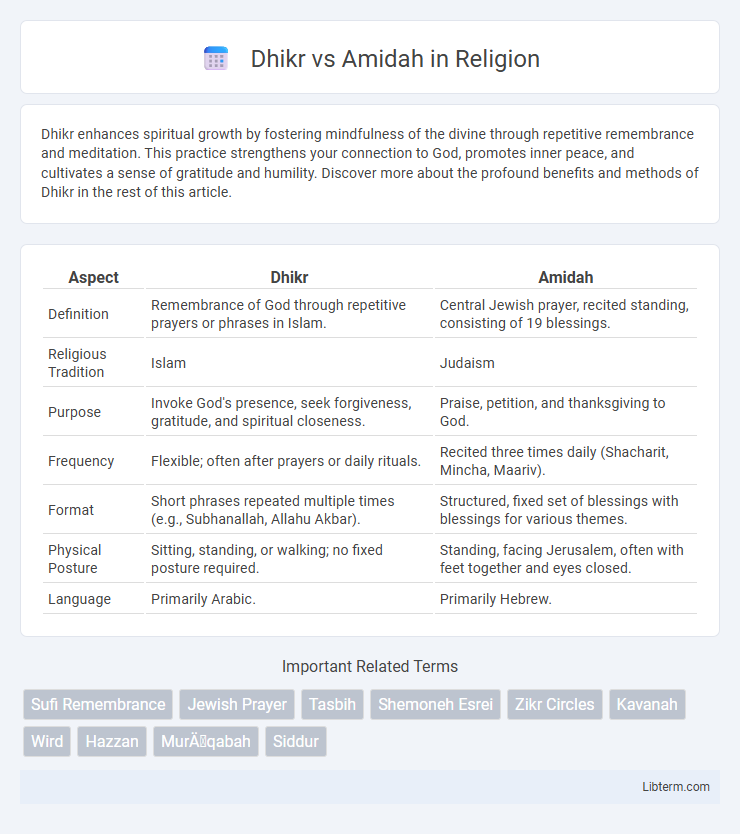Dhikr enhances spiritual growth by fostering mindfulness of the divine through repetitive remembrance and meditation. This practice strengthens your connection to God, promotes inner peace, and cultivates a sense of gratitude and humility. Discover more about the profound benefits and methods of Dhikr in the rest of this article.
Table of Comparison
| Aspect | Dhikr | Amidah |
|---|---|---|
| Definition | Remembrance of God through repetitive prayers or phrases in Islam. | Central Jewish prayer, recited standing, consisting of 19 blessings. |
| Religious Tradition | Islam | Judaism |
| Purpose | Invoke God's presence, seek forgiveness, gratitude, and spiritual closeness. | Praise, petition, and thanksgiving to God. |
| Frequency | Flexible; often after prayers or daily rituals. | Recited three times daily (Shacharit, Mincha, Maariv). |
| Format | Short phrases repeated multiple times (e.g., Subhanallah, Allahu Akbar). | Structured, fixed set of blessings with blessings for various themes. |
| Physical Posture | Sitting, standing, or walking; no fixed posture required. | Standing, facing Jerusalem, often with feet together and eyes closed. |
| Language | Primarily Arabic. | Primarily Hebrew. |
Introduction to Dhikr and Amidah
Dhikr, an Islamic devotional act involving the repetitive utterance of God's names or phrases, fosters spiritual mindfulness and inner peace. Amidah, also known as the Standing Prayer, is a central Jewish prayer recited during daily worship, expressing praise, petition, and gratitude to God. Both practices serve as foundational elements in their respective faiths, emphasizing personal connection and devotion through structured recitation.
Historical Origins of Dhikr and Amidah
Dhikr, rooted in early Islamic traditions, emerged as a devotional practice emphasizing the repetitive remembrance of Allah's names and attributes, traceable to the Prophet Muhammad's spiritual teachings in the 7th century. Amidah, also known as the Shemoneh Esrei, originated in Jewish worship during the Second Temple period, formalized by the Men of the Great Assembly around the 5th century BCE as a structured series of blessings. Both practices evolved to structure individual and communal prayer, reflecting distinct theological frameworks within Islam and Judaism.
Core Meanings: Dhikr in Islam, Amidah in Judaism
Dhikr in Islam centers on the repetitive remembrance and glorification of Allah through phrases and supplications, reinforcing spiritual awareness and connection with the Divine. Amidah in Judaism is a central prayer composed of a series of blessings that affirm praise, petition, and gratitude towards God, serving as a foundational element of daily worship. Both Dhikr and Amidah function as core devotional practices emphasizing continual communication and reverence in their respective religious traditions.
Ritual Practice: How Dhikr is Performed
Dhikr, an Islamic devotional act, involves the repetitive chanting of God's names or phrases to cultivate spiritual awareness and closeness to Allah. Performed individually or in groups, Dhikr can be silent or vocal, often accompanied by rhythmic breathing or hand movements, emphasizing mindfulness and remembrance. The Amidah, a structured Jewish prayer recited standing, contrasts Dhikr's flexible practice by following specific blessings and sequences central to daily worship.
Ritual Practice: How Amidah is Performed
The Amidah, also known as the Shemoneh Esrei, is a central Jewish prayer performed standing silently and facing Jerusalem, consisting of nineteen blessings including praise, petition, and thanksgiving. During the ritual, worshippers often sway gently back and forth, a practice called "shuckling," enhancing concentration and spiritual connection. Unlike Dhikr in Islamic tradition, which involves repetitive chanting aloud or silently, the Amidah emphasizes quiet, personal devotion and structured liturgical formality.
Spiritual Significance of Dhikr
Dhikr, the Islamic practice of remembrance of God through repeated phrases and supplications, holds profound spiritual significance by fostering a continuous connection with the Divine, promoting inner peace, and enhancing mindfulness. Unlike the Amidah, a formal Jewish prayer central to synagogue services, Dhikr emphasizes personal, repetitive invocation that deepens spiritual awareness and cultivates humility. Its rhythmic repetition aids in transcending worldly distractions, leading to a heightened state of spiritual consciousness and divine proximity essential in Sufi traditions.
Spiritual Significance of Amidah
The Amidah holds profound spiritual significance in Judaism as it serves as the central prayer of daily worship, connecting worshippers directly with God through heartfelt praise, requests, and gratitude. Unlike Dhikr in Islam, which emphasizes repetitive invocation of God's names to attain spiritual mindfulness, the Amidah encompasses a structured, comprehensive dialogue that aligns personal and communal aspirations with divine will. This prayer cultivates spiritual elevation and fosters a deep sense of humility and devotion within the practitioner.
Similarities Between Dhikr and Amidah
Dhikr and Amidah both serve as central forms of prayer in Islam and Judaism, respectively, emphasizing direct communication with God through recitation and reflection. Each practice involves repetitive, meditative phrases that cultivate spiritual mindfulness and devotion, promoting inner peace and divine connection. Both rituals are integral to daily worship, reinforcing faith and commitment within their religious traditions.
Key Differences in Practice and Purpose
Dhikr involves repetitive recitation of divine names or phrases to cultivate constant remembrance of God, emphasizing personal spiritual connection and mindfulness. Amidah, also known as the Standing Prayer, is a formal, structured Jewish prayer performed three times daily, central to communal worship and expressing praise, petition, and gratitude. The primary difference lies in Dhikr's flexible, continuous practice aimed at inner reflection versus Amidah's fixed liturgical format focused on collective religious obligation.
Contemporary Relevance of Dhikr and Amidah
Dhikr, the Islamic practice of remembrance through repetitive invocation of God's names, offers a flexible form of spiritual mindfulness adaptable to modern lifestyles, promoting mental peace and resilience in contemporary stressful environments. Amidah, the central Jewish prayer recited thrice daily, provides structured moments of reflection aligned with tradition, fostering a sense of community and continuity in rapidly changing societies. Both practices serve as vital spiritual anchors, enhancing individual well-being and cultural identity amid globalization and secular pressures.
Dhikr Infographic

 libterm.com
libterm.com